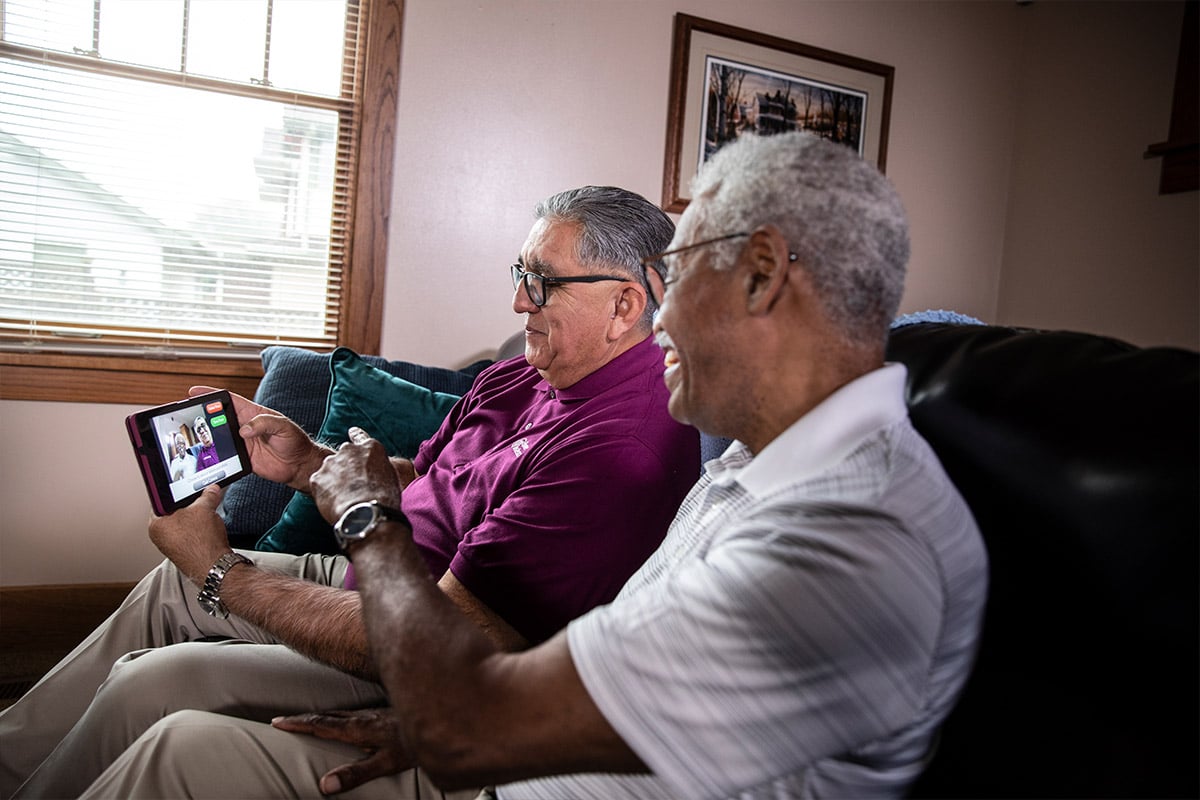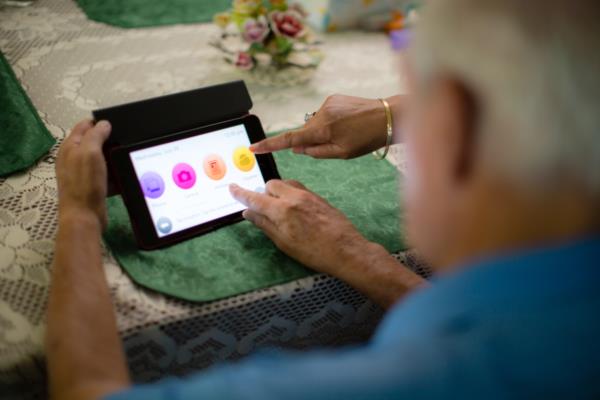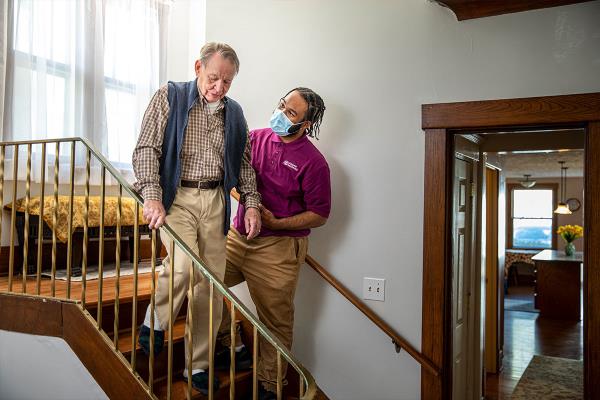In recent years, technology has revolutionized various aspects of our lives, and senior care is no exception. Modern advancements, such as telehealth, medical alert systems, and smart home devices, have significantly improved the quality of care for seniors. These innovations not only enhance the safety and well-being of older adults but also provide peace of mind for their families and caregivers. At Home Instead of Carrollton, TX, we recognize the importance of integrating technology into our caregiving practices to ensure our clients receive the best possible care. In this article, we explore how technology is enhancing senior care and how our caregivers can assist seniors in utilizing these advancements.
Telehealth: Bridging the Gap in Healthcare
Telehealth has emerged as a game-changer in the healthcare industry, offering seniors a convenient and efficient way to access medical care from the comfort of their homes. Through video consultations, seniors can connect with healthcare providers, receive medical advice, and manage chronic conditions without the need for in-person visits. This technology is particularly beneficial for seniors with mobility issues or those living in remote areas.
Benefits of Telehealth for Seniors
- Accessibility: Seniors can easily access medical professionals, reducing the need for transportation and minimizing the risk of exposure to illnesses.
- Convenience: Routine check-ups and follow-up appointments can be conducted virtually, saving time and effort.
- Continuity of Care: Telehealth ensures that seniors receive consistent medical attention, which is crucial for managing chronic conditions.
How Home Instead Caregivers Can Help
Home Instead caregivers can assist seniors in setting up and using telehealth platforms, ensuring they are comfortable and confident during virtual consultations. Caregivers can also help seniors prepare for appointments by organizing medical information, setting up necessary devices, and providing emotional support during the consultation.
Medical Alert Systems: Ensuring Safety and Security
Medical alert systems are vital tools for enhancing the safety and security of seniors, especially those living independently. These systems typically consist of wearable devices equipped with emergency buttons that seniors can press to alert emergency services or designated contacts in case of a fall or medical emergency.
Benefits of Medical Alert Systems
- Immediate Assistance: Seniors can quickly summon help in emergencies, potentially saving lives and reducing the severity of injuries.
- Peace of Mind: Both seniors and their families can feel reassured knowing that help is readily available at the push of a button.
- 24/7 Monitoring: Many medical alert systems offer round-the-clock monitoring, ensuring seniors are never alone in a crisis.
How Home Instead Caregivers Can Help
Home Instead caregivers can assist seniors in selecting and setting up medical alert systems tailored to their needs. They can also ensure that seniors wear their devices consistently and understand how to use them effectively. Additionally, caregivers can act as emergency contacts, ready to respond swiftly when alerted.
Smart Home Devices: Creating a Safe and Comfortable Environment
Smart home devices have become increasingly popular for their ability to enhance the safety, comfort, and convenience of senior living environments. From voice-activated assistants to automated lighting and temperature controls, these devices can significantly improve the quality of life for seniors.
Benefits of Smart Home Devices
- Enhanced Safety: Devices like smart smoke detectors, security cameras, and motion sensors can prevent accidents and alert caregivers to potential hazards.
- Convenience: Voice-activated assistants can help seniors manage daily tasks, such as setting reminders, making phone calls, and controlling household appliances.
- Energy Efficiency: Automated lighting and temperature controls can optimize energy usage, reducing utility costs.
How Home Instead Caregivers Can Help
Home Instead caregivers can assist seniors in setting up and using smart home devices, ensuring they are configured correctly and tailored to individual needs. Caregivers can also educate seniors on the functionality of these devices and integrate them into daily routines to enhance safety and convenience.
The Role of Home Instead Caregivers in Technology Integration
At Home Instead, our caregivers play a crucial role in helping seniors embrace and benefit from modern technology. By providing hands-on assistance, education, and support, our caregivers ensure that seniors can effectively use telehealth services, medical alert systems, and smart home devices to improve their quality of life.
Training and Education
Home Instead caregivers receive training on various technological tools and devices, enabling them to guide seniors through the setup and usage processes. This training ensures that caregivers are well-equipped to address any technical issues and provide ongoing support.
Personalized Assistance
Our caregivers take the time to understand each senior's unique needs and preferences, recommending and setting up technology solutions that best suit their lifestyles. This personalized approach ensures that technology enhances, rather than complicates, the lives of our clients.
Continuous Support
Technology can sometimes be intimidating, especially for seniors who may not be familiar with the latest advancements. Home Instead caregivers offer continuous support, helping seniors build confidence in using these tools and ensuring they remain comfortable with their technology over time.
The integration of technology into senior care has opened up new possibilities for enhancing the safety, health, and well-being of older adults. At Home Instead in Carrollton, TX, we are committed to leveraging these advancements to provide the highest quality care for our clients. By embracing telehealth, medical alert systems, and smart home devices, and by offering comprehensive support from our dedicated caregivers, we ensure that seniors can enjoy a safer, more comfortable, and more fulfilling life.
Alzheimer's or dementia is a journey filled with both challenges and rewards. As these conditions progress, the demands on family caregivers can become overwhelming, leading to physical, emotional, and mental stress. This is where in-home caregivers come into play, offering a valuable alternative to institutional care. Here, we explore the numerous benefits of in-home caregivers for individuals with Alzheimer's and dementia, tailored to the needs of families in Carrollton, TX.
Personalized and Familiar Environment Helps with Alzheimer's & Dementia
One of the most significant advantages of in-home care is that it allows individuals to stay in a familiar environment. Familiarity is crucial for those with Alzheimer's and dementia, as it can reduce confusion and agitation. Being surrounded by personal belongings, family photos, and the comforts of home can have a calming effect and help maintain a sense of normalcy.
The Benefits of Familiar Surroundings are Many
The disorientation caused by new environments can exacerbate the symptoms of Alzheimer's and dementia. A familiar setting helps reduce anxiety and stress, allowing individuals to feel safer and more secure.
For family members, knowing that their loved one is receiving around-the-clock care brings immense peace of mind. They no longer have to worry about what might happen when they cannot be there, whether due to work, personal commitments, or needing rest themselves. This assurance allows family members to focus on enjoying their time with their loved ones, rather than being consumed by the stress and worry of constant caregiving.
Maintaining consistent daily routines is easier at home. Routines help individuals with Alzheimer's and dementia know what to expect, which can significantly reduce confusion and behavioral issues. The presence of personal items such as favorite chairs, family heirlooms, and familiar scents can provide comfort and reassurance. These elements of home can evoke positive memories and create a sense of continuity and identity.
Furthermore, in-home caregivers can tailor their approach to align with the individual's lifestyle and preferences. This means that meal times, sleeping schedules, and recreational activities can be customized to fit what the person is used to, promoting a sense of control and autonomy.
Importance of Familiar Faces
In-home care allows family members to be more involved in the daily care process. This constant presence of loved ones can be immensely reassuring for individuals with Alzheimer's and dementia, fostering emotional stability and enhancing their overall well-being.
Building a trusting relationship with a consistent caregiver can improve the care recipient's comfort level. Familiarity with the caregiver's face, voice, and mannerisms can create a sense of safety and trust, which is essential for effective care.
Cognitive and Emotional Benefits
Familiar surroundings can help trigger memories and cognitive associations. For instance, seeing family photos or objects from the past can stimulate conversations and mental engagement, which are beneficial for cognitive health.
Being in a place where an individual has lived for years, and where they have built many memories, can significantly contribute to their emotional well-being. The comfort of home can mitigate feelings of loss and disorientation that often accompany institutional care.
Individualized Alzheimer's & Dementia Care
In-home caregivers provide one-on-one attention that is often not possible in institutional settings. This personalized care ensures that the unique needs of each individual are met, from managing medications to providing companionship and engaging in activities that stimulate cognitive function. Care plans are tailored to the specific symptoms and stages of the disease, offering a level of customization that facilities may not be able to provide.
Tailored Care Plans
Each individual with Alzheimer's or dementia experiences the condition differently. In-home caregivers can create and adapt care plans that address specific symptoms, behaviors, and needs. This can include personalized schedules for daily activities, tailored therapeutic interventions, and specific dietary requirements.
In-home care allows for flexibility that institutional settings often cannot provide. Caregivers can adjust their approach based on the evolving needs of the individual, ensuring that the care remains effective and relevant as the disease progresses.
In-home caregivers can focus on holistic care, addressing not just the medical needs but also the emotional, social, and psychological well-being of the individual. This comprehensive approach promotes overall health and quality of life.
Specialized Attention
In-home caregivers can devote their full attention to one individual, providing care that is responsive and attentive. This contrasts with institutional settings, where staff may be responsible for multiple residents, making it challenging to offer the same level of personalized attention.
Continuous, personalized care allows caregivers to closely monitor changes in health, behavior, and mood. Early detection of issues such as medication side effects or new symptoms can lead to prompt intervention and better management of the condition.
Physical, Emotional and Cognitive Support
Caregivers can incorporate physical exercises tailored to the individual’s abilities, helping to maintain mobility, strength, and balance. Regular physical activity can improve overall health, reduce the risk of falls, and promote a sense of well-being.
In-home caregivers can incorporate activities that are specifically designed to stimulate cognitive function and provide emotional support. This can include puzzles, memory games, music therapy, and other activities tailored to the individual's interests and abilities.
Personalized care fosters strong emotional connections between the caregiver and the individual. These connections are vital for providing emotional support, companionship, and a sense of security, all of which contribute to the overall well-being of the person with Alzheimer's or dementia.
Health and Safety Management
In-home caregivers can manage complex medication schedules, ensuring that the individual takes their medications correctly and on time. This reduces the risk of missed doses or adverse drug interactions, which are common concerns in Alzheimer's and dementia care.
Caregivers can prepare meals that meet the specific dietary needs of the individual, addressing any nutritional deficiencies and promoting overall health. This personalized attention to diet can help manage symptoms and improve quality of life.
Caregivers can implement and monitor safety measures within the home, such as ensuring a secure environment, preventing wandering, and reducing fall risks. This personalized approach to safety is critical for protecting individuals with Alzheimer's and dementia.
Enhanced Quality of Life with Alzheimer's
In-home care can significantly enhance the quality of life for individuals with Alzheimer's and dementia. Caregivers help with daily activities such as bathing, dressing, and meal preparation, allowing individuals to maintain a level of independence and dignity. Additionally, caregivers can engage clients in meaningful activities and hobbies, promoting mental stimulation and emotional well-being.
Maintaining Independence and Dignity
In-home caregivers provide support with activities of daily living (ADLs), such as bathing, dressing, grooming, and toileting. This assistance helps individuals maintain their hygiene and appearance, which is vital for their self-esteem and dignity.
Caregivers can encourage individuals to participate in tasks they are still capable of performing, fostering a sense of independence. Even simple activities like setting the table or folding laundry can provide a sense of accomplishment and purpose.
Personalized Engagement
In-home caregivers can tailor activities to the individual’s interests and abilities, providing mental stimulation and enjoyment. These activities can include puzzles, gardening, crafts, music therapy, and reminiscence therapy. Engaging in familiar and enjoyable activities can boost mood and cognitive function.
Regular social interaction is essential for emotional well-being. In-home caregivers provide companionship and conversation, reducing feelings of loneliness and isolation. This social support is crucial for maintaining mental health and emotional stability.
Emotional and Psychological Support
Caregivers can provide emotional support by being a consistent and reassuring presence. They can help individuals express their feelings and cope with the emotional challenges of Alzheimer's and dementia.
A positive and supportive environment can significantly impact the emotional well-being of individuals with Alzheimer’s and dementia. Caregivers can create a calm, patient, and understanding atmosphere, which can reduce anxiety and agitation.
Nutritional and Health Benefits
Caregivers can prepare nutritious meals that cater to the dietary needs and preferences of the individual. Proper nutrition is vital for overall health, and a balanced diet can help manage symptoms and improve quality of life. Ensuring that individuals stay hydrated is essential, especially for those who may forget to drink fluids regularly. Caregivers can monitor and encourage fluid intake, preventing dehydration and related health issues.
Tailored Routines
Establishing and maintaining consistent daily routines can provide a sense of stability and predictability for individuals with Alzheimer’s and dementia. Caregivers can structure the day with regular meal times, activities, and rest periods, reducing confusion and anxiety. Caregivers can adapt schedules to the individual’s natural rhythms and preferences. This personalization can enhance comfort and cooperation, leading to a more harmonious daily routine.
Peace of Mind
The presence of a professional caregiver provides peace of mind to family members, knowing that their loved one is safe, well-cared for, and monitored. This assurance can significantly reduce the stress and worry that often accompany caregiving.
In-home caregivers are trained to handle emergencies and can provide immediate assistance if needed. This readiness further enhances the peace of mind for family members, knowing that their loved one is in capable hands.
Cost-Effective Solution for In-Home Alzheimer's Care
In-home care can be a cost-effective alternative to assisted living or nursing home care. While the costs can vary based on the level of care required, many families find that in-home care is more affordable, especially when considering the emotional and physical toll that full-time caregiving can take on family members.
Lower Overall Costs
In-home care services offer flexible care plans that can be tailored to the specific needs and budget of each family. Whether it’s a few hours a day or around-the-clock care, families can choose a plan that fits their financial situation, potentially lowering overall costs compared to full-time residential care.
Assisted living and nursing home facilities often come with high monthly fees that cover room, board, and various services. In-home care eliminates these substantial housing and facility costs, making it a more economical option for many families.
Pay for What You Need
With in-home care, families pay only for the services they need. This customization means that families can allocate their budget towards essential services, such as personal care, medical management, and companionship, without paying for unnecessary amenities.
Families who do not require full-time care can opt for part-time or respite care services. This allows caregivers to step in when needed, providing flexibility and cost savings compared to committing to a full-time facility.
Reduced Indirect Costs
With in-home care, there is no need for family members to frequently travel to and from a care facility. This can result in significant savings on transportation costs, time, and effort.
Keeping a loved one at home means families do not have to sell the family home to cover the costs of residential care. Maintaining home equity can be a significant financial advantage and provide a sense of stability and security for the family.
Financial Assistance and Insurance
Some in-home care services may be covered by Medicare, Medicaid, or other insurance plans, reducing out-of-pocket expenses for families. It’s essential to explore and understand the coverage options available to take full advantage of these benefits. Veterans and their families may be eligible for benefits that cover in-home care services. Programs such as the VA Aid and Attendance benefit can provide financial assistance, making in-home care more affordable.
Reduced Health-Related Costs
As mentioned earlier, in-home care can reduce the risk of hospitalization by providing consistent and attentive care. Avoiding hospital stays and emergency room visits can save families substantial amounts in medical expenses. In-home caregivers can help manage chronic conditions and ensure adherence to medical regimens, reducing the need for costly medical interventions and ongoing treatments.
Long-Term Financial Planning
In-home care services can be part of a long-term care plan that allows families to budget and prepare for future needs. By planning ahead and understanding the costs associated with different levels of care, families can make informed decisions that align with their financial goals.
Families can start with part-time or respite care and gradually increase the level of care as needed. This incremental approach allows families to manage costs effectively over time, rather than facing the immediate and often high costs of transitioning to a full-time care facility.
Choosing the right care for a loved one with Alzheimer's or dementia is a deeply personal decision. In-home caregivers offer a compassionate and personalized approach that can enhance the quality of life for both individuals and their families. By providing care in a familiar environment, offering individualized attention, and supporting the emotional and social needs of clients, in-home care stands out as a valuable option for those navigating the challenges of Alzheimer's and dementia.
For more information about the Alzheimer's and dementia care services provided by Home Instead Senior Care in Carrollton, TX, visit Home Instead now.



